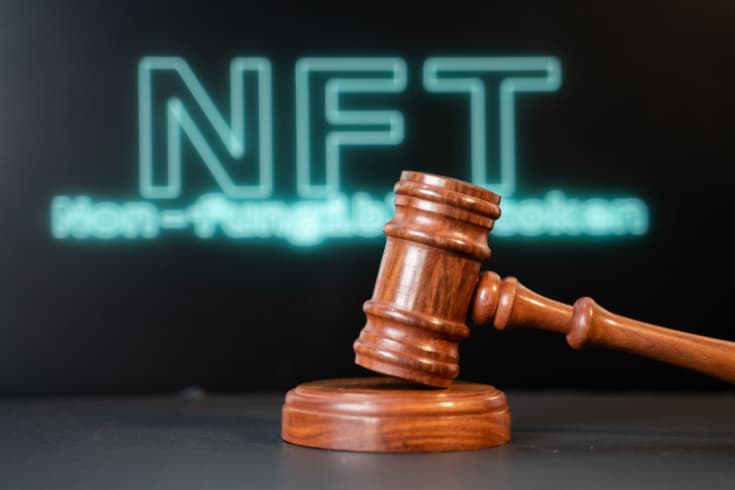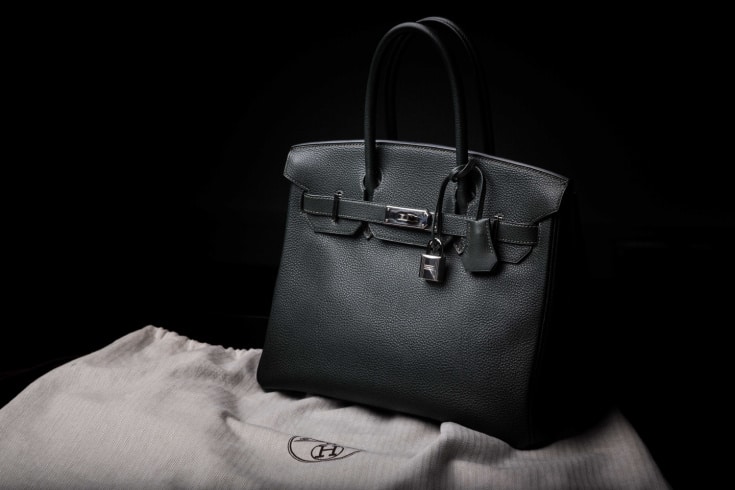Trademark Infringement in the NFT Market: Cases and Current Status in Japan

NFT stands for “Non-Fungible Token” and refers to irreplaceable tokens issued using blockchain technology that are difficult to counterfeit or tamper with. With the expansion of the NFT market, there have been an increasing number of cases of trademark infringement, such as the sale of art imitating famous brand designs.
In this article, we will discuss trademark infringement in the NFT market and provide examples of relevant overseas court cases. Our focus will be on the intersection of NFTs and trademark law.
Trademark Infringement in the NFT Market
A trademark right is an integral part of intellectual property rights. It grants exclusive rights to use characters, figures, shapes, sounds, colors, etc. to differentiate one’s products and services from others. Obtaining trademark rights involves submitting a trademark application to the Patent Office and successfully registering the trademark.
Trademark rights enable you to restirct the use of indentical or similar marks by others so that consumers can accurately indentify your products or services. Trademark rights also allow companies to enhance their brand value.
Trademark infringement occurs when someone uses the same or a similar trademark without the owner’s consent, leading to consumer confusion and damage to the trademark owner’s interests. The owner of the violated trademark can seek a prohibition order or compensation for damages.
In the NFT market, there has been a rise in trademark infringement cases, including the creation of NFT projects that feature designs resembling branded products, and the unauthorized use of brand trademarks in the sale of NFTs.
Trademark Infringement of NFTs Overseas

Let us examine instances of trademark infringement related to NFTs abroad.
The Hermès “Metabirkin” Case
In 2021, an artist who goes by the name of Mason Rothschild has introduced an NFT artwork titled “Meta Birkin”, an NFT artwork that mimics Hermes’ famous Birkin bag.
The Meta Birkin is a bag that mimics the Birkin and is decorated with various paintings and icons. Approximately 100 Meta Birkins were sold, and Mr.Rothschild is said to have made a profit of approximately $125,000, including profits from secondary distribution.
In January 2022, Hermès filed a lawsuit against Rothschild in the federal district court of Manhattan. The lawsuit alleges that Metabakin has caused consumer confusion. To establish trademark infringement in the United States, two requirements must be met under U.S. Trademark Law.
- The plaintiff is the owner of a registered trademark.
- The defendant’s utilization of the trademark has the potential to result in consumer confusion.
As the owner of the Birkin trademark, Hermès easily met the first requirement without dispute.
As Hermes had not previously issued or sold NFTs, there was some debate as to whether consumers could potentially be misled.
Hermes asserted that they had a pre-existing NFT plan dating back to 2019, and expressed concern that Metabirkin could cause consumer confusion and disrupt their NFT plan.
The lawsuit tackled the question of whether NFTs should be classified as works of art or commodities.
Meanwhile, Mr. Rothschild contended that “Meta Birkin is a piece of art, and my rights under the First Amendment to the United States Constitution allow me to create and distribute works featuring Birkin bags.”
MetaBirkin was found guilty of trademark infringement by a jury in the United States District Court of Manhattan. The jury ruled that trademark law applies to MetaBirkin since it is not considered a work of art. As a result, Mr. Rothschild was instructed to compensate $133,000 in damages.
Following the ruling, Mr. Rothschild has announced his intention to appeal, and further court decisions are now being closely monitored.
Nike case
On February 3, 2022, Nike reportedly filed a lawsuit in the U.S. District Court for the Southern District of New York against Stock X, an online exchange for resale sneakers, seeking damages for trademark infringement.
In response to the fact that Nike sneakers are included in the NFTs, called Vault NFTs, published by Stock X, Nike claims that Stock X is selling NFTs that use Nike’s trademarks without permission.
In the Meta Birkin incident previously mentioned, only NFTs featuring images that mimic bag designs were exchanged. However, the Nike case differs from the Meta Birkin case in that it involves an NFT linked to physical products, namely sneakers.
SInce Nike acquired a startup company called RTFKT (Artifact) and was planning to release virtual products on RTFKT, Nike is expected to expand into the digital realm in the future.
As of February 2023, no verdict has been given in this trial, therefore it is imperative to monitor any future developments.
Current Status of NFTs and Trademark Infringement in Japan

Although NFT art that replicates real clothing designs is gaining popularity on the Japanese NFT market, legislation and discussions regarding it are still in their infancy. Using a registered brand or item name without permission is considered a trademark violation, but there are currently few companies that have registered trademarks specifically for NFT imitations.
To mitigate the risks, the company will need to register NFT-related products. However, it remains uncertain how much protection will be afforded in cases where the brand name is solely referenced in the product description.
In order for trademark infringement to be acknowledged, two requirements must be met.
- The registered trademark or something similar must be utilized.
- There must be similarity in the products or services being offered.
The question at hand pertains to the applicability of the second criterion for “similarity of products, etc.” in the context of NFT. With regards to NFT art that replicates the design of tangible clothing, it may not satisfy the requirement of similarity in products, etc. between said clothing and NFT art. Therefore, there exists a possibility that trademark infringement will not be established.
If the use of a trademark does not infringe on any rights, it may still be considered an act of causing confusion with well-known indications or using famous indications under the Unfair Competition Prevention Act of Japan. In such cases, we reserve the right to suspend sales or demand compensation for damages.
Acts of labeling that are publicly known to cause confusion refer to the use of labels that are the same or similar to those widely recognized by consumers as the labeling of other people’s goods and services, and that result in confusion with other people’s goods and services. For instance, this could occur when operating a business in a store that resembles a popular coffee chain.
The act of using a well-known trademark involves utilizing another party’s trademark for their own goods or services. This can be true even if the consumer is not misled. A prime example would be naming a sex shop after a popular brand name.
NFT Market and Trademark Issues: Why You Need to Consult a Lawyer
Legal precedents relating to trademark infringement in the NFT market are gradually emerging in the United States, as evidenced by Hermès’ success in the Meta Birkin lawsuit. However, there are no existing judicial precedents in Japan, and it cannot be asserted that all legal issues have been addressed.
As NFT art often involves high-value transactions, trademark infringement can result in significant harm.
Although claiming trademark infringement may be challenging, it is possible to pursue an injunction against sales or compensation for damages under other laws, such as Japan’s Unfair Competition Prevention Act. If you suspect that your trademark rights have been violated on the NFT market, we strongly advise seeking legal counsel promptly.
Countermeasure Guidance by Our Office
Monolith Law Firm is a well-experienced law firm that specializes in IT, particularly the Internet, and law. As NFTs continue to gain attention, we anticipate an increase in issues related to intellectual property laws, such as copyrights and trademark rights. To address this, we offer solutions related to blockchain and crypto assets.
Category: IT





















